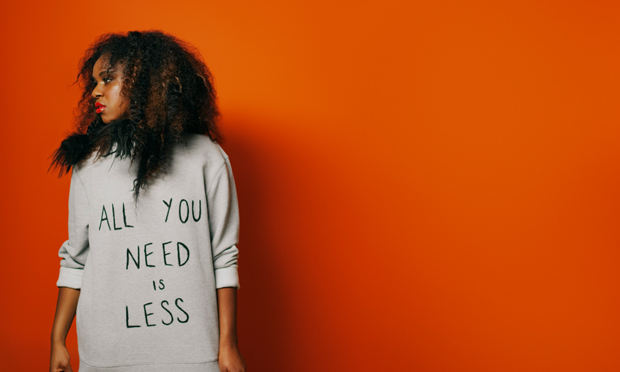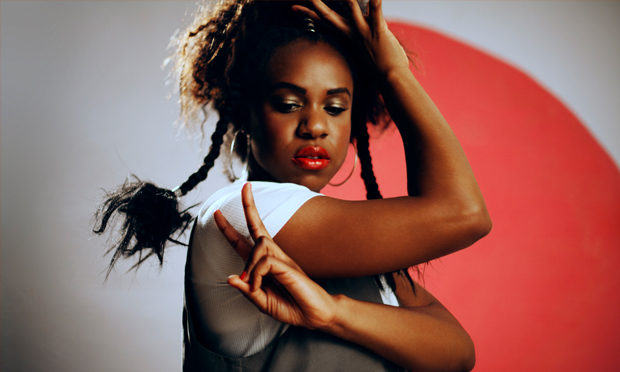Too late to stop Nao: interview

Nao: “Vocal acrobatics and flair…” Photograph: Jeff Hahn
The story of Nao is not one of overnight success. The 28-year-old East Londoner this year released her debut album For All We Know to some acclaim, with critics hailing her vocal acrobatics and flair in taking the sounds of her old school idols and bringing them up to date. But in contrast to the fame-hungry, manufactured stars of today, the rise to prominence of Nao (née Neo Jessica Joshua) is the result of years of hard work. She has been gigging since the age of 14, studied jazz at music school and been a session vocalist for the likes of Jarvis Cocker and Kwabs. Here she talks about East London sounds, the joy of jamming and ‘wonky funk’…
You grew up and live in East London. How does that come through in your music?
East London has always been a hub for fresh and original music. When I was growing up in my teenage years we were listening to pirate radio stations and grime crews like Heartless Crew and Pay as U Go. They were all people who weren’t signed and were just on the hustle and I think that influenced me in following my own nose. It made me think, ‘I love making music so I’m just going to get on the grind and hope that one day it works out.’ It’s beginning to.
And your recording studio is on Ridley Road, home of the famous market. Do you find inspiration there for your music amongst the market stalls and traders?
I love hustle and bustle and Ridley Road definitely has that. When I’ve been in the studio working without windows or people for a long time I’ve started going out in Dalston, clubbing a little bit just to let my hair down. And I was hearing all these new tunes that people were getting down to and I was like ‘ when did this music come out?’ So it helps me keep up to date with new music that’s for sure.
It’s been a rollercoaster couple of years for you, from your first EP in 2014 to a MOBO nomination, playing Glastonbury twice, coming third in BBC’s Sound of 2016 poll and now a debut album under your belt. How are you coping with the success?
Well I’m not Adele so I don’t get mobbed down the street but it’s definitely a new path for me. I’m realistic though. I understand stuff goes up and stuff comes down and that with the music business you can’t really hold your self-esteem to it because it’s fickle. So I just make music because I love it though obviously I want other people to enjoy it too.
Does the fact you’ve been gigging since you were 14 make you appreciate this all the more?
Yeah, 100 per cent. I’ve been gigging most of my life around London and around the world actually and when I was doing those shows I was a voice of other people’s projects, a singer just floating around. But it did teach me about stage presence, about performing and it taught me about how to be a professional and I learnt my craft trying to be good vocalist. I appreciate that all those years have helped me in my late 20s hopefully be at a good standard.
You worked with some well-respected producers on For All We Know (Grades, A.K. Paul, Loxe, John Calvert) yet there’s something quite homespun about it, like the inclusion of voice memos. What was the rationale there?
You’re right, it’s definitely not all that polished. I recorded all the vocals in my cupboard at home and sometimes you can hear a train going past because I live by the train tracks. There’s a couple of voice memos in there, one in front of a song called Happy and another straight afterwards. And that’s basically an insight into how that song came about. When I make music I leave my phone recording for hours because you never know what you’re going to come up with. So I was recording me and my friends jamming around and we started to form the bass line and then you can hear the chorus developing. I just wanted to show that it’s not about being in the studio with Pharrell, it’s about sitting with people you’re comfortable with, jamming it out and finding a song within that beautiful moment.
You studied vocal jazz at the Guildhall School of Music and Drama, which suggests to me you’ve always been very serious about a career in music. When did you realise it was something you wanted to do full-time?
I knew I wanted to be a musician from very young, but not from watching Popstars on TV – there was something about dancing around in a video didn’t click for me. Some of the musicians I love are pretty old school, like Stevie Wonder and Aretha Franklin. They’re amazing musicians and that’s why I went to the Guildhall to study jazz because it was all about musicianship, and I got to compose for orchestras and arrange for like big bands and things like that. Hopefully throughout the album you can hear strong musicianship because that’s what I’ve always wanted to get across.
You’ve described your particular type of music as ‘wonky funk’. What does that mean and why have you felt the need to invent your own genre?
Well a lot of people connect me to R&B and I see R&B as quite a particular thing. It’s quite smooth, it’s quite silky, it’s quite… I don’t know, it’s quite sexual sometimes. But I feel with my music there are so many colours in there: there’s funk, there’s R&B, there’s electronic future music in there. It’s just an amalgamation of all the things I grew up listening to, so for all those people putting me into one bracket because I don’t sound like Usher I just made up my own genre. The funk I take from people like Prince and Michael Jackson who I love and the ‘wonkiness’ is my own interpretation for the moment that we live in. My music doesn’t sound retro, it doesn’t sound like it’s recorded in the 70s, it sounds new I hope, it sounds contemporary.
For All We Know is out now on Little Tokyo Recordings

